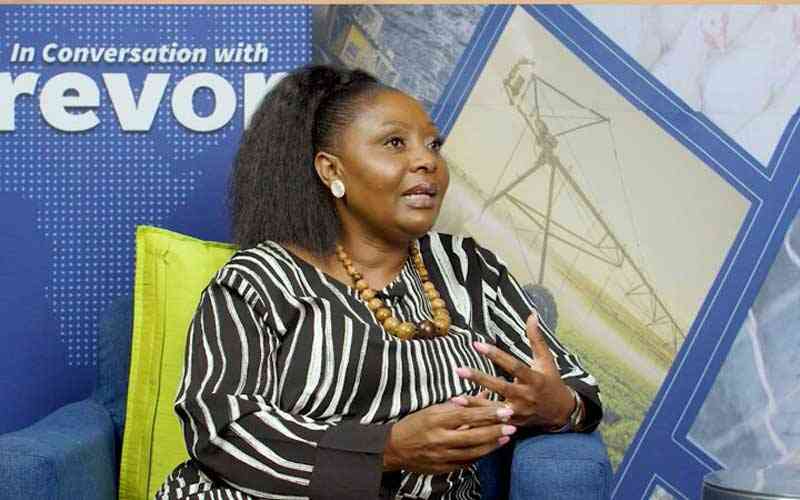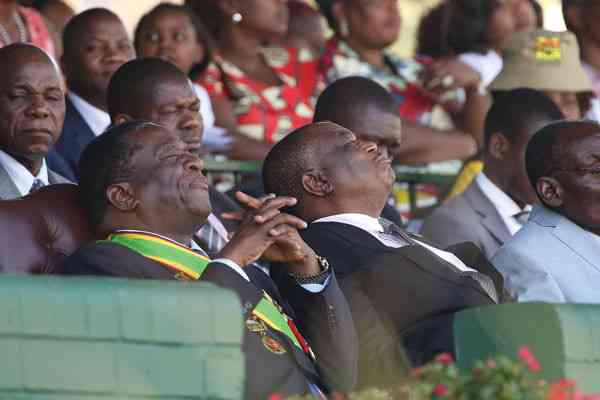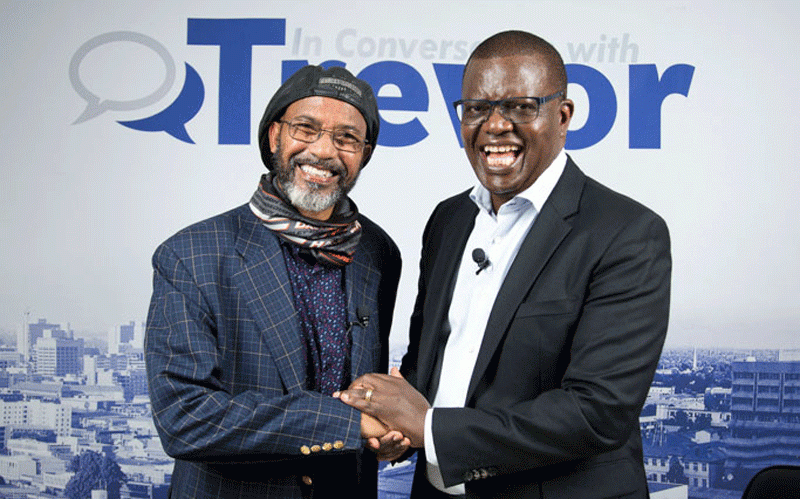
Psychologist and counsellor Pamela Marwisa says most marriages in Zimbabwe are failing because of infidelity and the high number of people migrating, among many other issues.
Marwisa (PM), who is the co-founder of College of Marriage, Parenting and Family and Transformation Team, shared her experience as a counsellor dealing with broken marriages on the platform In Conversation with Trevor, which is hosted by Alpha Media Holdings chairman Trevor Ncube (TN).
Below are excerpts from the conversation
TN: Pamela Marwisa, welcome to In Conversation With Trevor.
PM: Thank you, Trevor. It is an honour to be here and thank you for having me.
TN: It is a pleasure having you. Pamela, what you do do is so important for this nation because as far as I am concerned, what Pamela Marwisa, and my good pastor, Pastor Marwisa is nation building.
Nation building is very important, particularly for Zimbabwe given where we are right now.
- Mavhunga puts DeMbare into Chibuku quarterfinals
- Bulls to charge into Zimbabwe gold stocks
- Ndiraya concerned as goals dry up
- Letters: How solar power is transforming African farms
Keep Reading
And I believe that nation building starts with the individual, then the family, and then society, then the school.
And what you are doing with marriages, with counselling around that, families and teenage counselling is so important because we do need those support structures to be able to build a nation.
PM: Yeah.
TN: So well done for the work that you are doing, particularly Pamela as the co-founder and operations director for College of Marriage, Parenting and Family. You are also co-founder uh operations director for Transformation Team. Talk to me about what you do at the College of Marriage Parenting and Family?
PM: Okay. So, College of Marriage, it is our sister company, the core company is Transformation Team.
TN: Right.
PM: So, with Transformation Team, it is more like the creative side where we offer counselling, we offer emotional wellness seminars to corporates, but we realised that that most of the issues that we are facing, even in the counselling rooms, they come from the family.
So it was birthed out of that need to say that we need to have probably a preventative approach.
So College of Marriage is more of the preventative approach to dealing with the issues that are in our communities, in our families.
So mainly we focus on training, family building, we offer you know courses like parenting courses, we offer marriage courses, and then we also offer family therapy.
So that is what College of Marriage is all about.
TN: Tell me, I mean marriages are so important, what issues do you come across that tend to poison, to affect, to put pressure on the marriages? What issues are you coming across?
PM: Okay, thank you Trevor. I think there is a lot of pressure on our families, mainly a lot of families are disintegrating.
I am sure you aware that most people are migrating, maybe going to the diaspora, so our families are disintegrated, and unfortunately [they are] a lot of issues on infidelity.
[That] is one of the main issues that we come across in the counselling rooms.
Infidelity, and unfortunately, I must say it is on both sides, you know both the men and the women, infidelity issues are huge.
TN: Can a marriage be cured once there has been infidelity? Can it be saved once there has been infidelity?
PM: Definitely. It just takes the commitment from both parties.
If they are committed and they are willing to work on the marriage, we have seen a lot of marriages being restored.
TN: What would be the key component there? Is it forgiveness? What is the key ingredient for that to happen?
PM: Definitely forgiveness, on the part of the person, you know, maybe the one partner who was cheated on.
If they are willing to show fruit of repentance, and also if they work on building whatever issues that may have contributed to the deterioration of that marriage.
And one of the things that we always say when we are counselling couples is that we have realised that when people stray it is because there are certain needs in the marriage that are not being met.
So, one of the things that we teach couples is to identify what your important needs for your spouses, and then you are more intentional about meeting those needs.
Because if those needs are met within the marriage, we are less likely to be tempted to stray because their needs are being met.
So we encourage couples to be intentional [in] meeting each other’s needs.
TN: Right.
PM: And also give them tools on how to affair proof their marriages, because sometimes you find maybe one of the partners does not have healthy boundaries with the opposite sex, and that is one of the causes that may lead to infidelity.
TN: What are the problems apart from infidelity that are affecting marriages?
PM: I think also financial pressures. If couples do not handle well the financial pressures.
You know things can be difficult financially, and yeah so, I think also that can put a strain on the marriage.
Sometimes it is about in-laws, extended families.
If you fail to handle those, and fail to set boundaries, that can also contribute to problems in marriages.
TN: You and I were having a conversation last week and you raised something, which I did not think affected marriage.
Misogyny in the marriage. As a factor that causes the marriages to rupture.
Talk to me about that, and what you are coming across?
PM: Okay. Misogyny, it is a term that is not very familiar to most people.
But maybe to just bring it down; it is just a man who is maybe narcissistic, very controlling, insensitive and over time during the course of the marriage sometimes the woman realises that this is not what I signed up for, and maybe she may even lose her self-esteem and she realises that I do not know who I am anymore in this relationship.
And usually that is when mainly the women come in for counselling and they are not even sure what is going on.
Usually [as] psychologist(s) we use a checklist and then when you ask them; does he do this, does he do that, competing for your attention with other people in your life, your children, is he controlling, and they take yes to probably 10 of those questions.
Then we can as confirm that you are in a misogynistic relationship where the man is over controlling.
TN: Can that be dealt with and rectified?
PM: Yes, and usually I always say every relationship is like a dance.
You find that most African men will not come for therapy because I do not know, it is a culture thing, and you know sitting down and having a stranger speak to you they do not come.
But I always say, even to my female clients, you can change the dynamics of the relationship even by yourself, because Trevor every relationship is like a dance, and when one person changes the dance, the other person is forced to to change.
Imagine if you are playing [or] dancing to kwasa kwasa and then suddenly you are putting [on] ballroom awards music....
TN: The other partner has to respond.
PM: Yeah. The other partner has to change.
So usually, it is just equipping the women, empowering them, helping them to set their boundaries, and if the husband or the partner values the relationship usually, they will change because then they realise the wife is serious and she is not bluffing.
One of the things that I found that is a challenge is when people set boundaries and then they do not enforce them.
The other partner knows oh no you know she will come around; she is bluffing.
But when you actually say you know the next time you raise your hand at me, I am going to the police, and you actually go to the police.
Or the next time you do this, or you are unfaithful I am going to pick my bags and I am going to leave.
So now you find the men are the ones [who] are coming and saying oh please counsel her or please you know my wife has left me please can we come for counselling.
TN: When it has gotten to the breaking point?
PM: Yes.
And I always tell the wife ndiwe unechimuti, call the shots, tell your partner the boundaries, that this I will tolerate, this I will not tolerate.
And usually, yes, misogynists can change.
TN: You know my marriage changed when God said to me you are kneeling down and praying that God should change your wife, it is you who needs to change.
PM: Wow. Wow. That is powerful.
TN: When that happened, when I realised that actually I should be praying and say Lord change me, and not change my wife.
So I agree with you. It is a dance that involves two people. But we tend to think it is the other person that needs to change.
PM: Yeah.
TN: And not me. And when I changed, my marriage changed.
PM: Yeah, that is very true. That is very true.
And it is good that you have raised that up.
And one of the things that we also share with couples is that sometimes we have what we call enabling behaviour.
We enable the other person to abuse us, you know by not setting boundaries.
So that is one of the books that I will recommend that every couple needs to read.
TN: What book is that?
PM: Boundaries. I think it is a book that was written by two psychologists Henry Cloud, and John Townsend.
TN: Yes.
PM: So it is...
TN: I think my wife has got that book, but I have not read it yet.
PM: Yeah, you should. It is a good read.
TN: What about, is it psychological bullying? Financial bullying? Does that term exist, or those terms exist? Do they happen within a marriage?
PM: Yes, it is also a form of abuse.
You know abuse comes in all shapes and sizes.
Normally when we think about abuse, we just think about physical abuse, but there can also be emotional abuse, and financial abuse, and making the other person be over responsible for everything.
Either way there are other men who do not put in anything, they depend [and] allow the woman to do everything.
Not merely because they are not working, even if they are, so there is also responsibility abuse, and yeah so it is possible to have financial abuse in a relationship.
TN: From where you sit Pamela, with all the experience that you have, if I asked you in what condition our collective marriages [are] in what would you say?
PM: I would say most of the, like we also talk about your marriage being in intensive care, [in] HDU, in the ward.
I would say maybe 50% of marriages are in HDU.
TN: Wow.
PM: Yeah.
TN: And what explains that in your view?
PM: What I realise is that people do not have tools.
People do not prepare adequately for marriage.
That is why we started College Of Marriage, Parenting and Family Affairs.
You know to try and also do the preventative side.
Most people just get your marriage certificate when you have not passed any exam.
So most people are not prepared.
People prepare, I mean [for] lawyers it takes maybe seven years to be a lawyer, it takes seven years to be a doctor, but when it comes to marriage people are just nonchalant about it and they just think immediately they will know what to do.
So we realise a lot of couples they do not have the basic tools that are needed for marriage you know to be successful.
And one of the things that we always say, my husband and I, when are working with couples is that love without the tools to help you navigate the issues that arise in a marriage is not enough to sustain that marriage.
We have seen people who love each other but divorcing, because they do not have the tools, conflict resolution tools, communication tools, and they are not aware even maybe of each other's strengths or weaknesses, personality, love languages, and you can really see that there is a gap there. So I think it is a lack of preparation for most couples.
l “In Conversation With Trevor” is a weekly show broadcast on YouTube.com//InConversationWithTrevor. The conversations are broadcast to you by Heart and Soul Broadcasting Services. The conversations are sponsored by WestProp Holdings.









